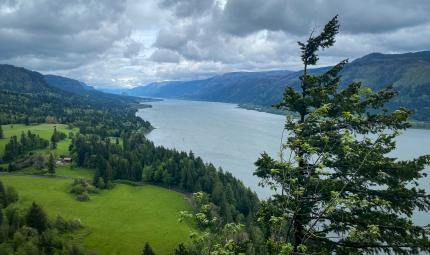Non-treaty fisheries and associated regulations in the shared waters of the Columbia River are managed cooperatively by Oregon and Washington, which includes the Columbia River Compact. These fisheries must meet a variety of conservation objectives, fishery sharing agreements, and policies, including but not limited to the U.S. v. Oregon Management Agreement, Endangered Species Act (ESA), Pacific Salmon Treaty, and Fish and Wildlife Commission policies.

The Columbia River Compact is an agreement between Oregon and Washington through which the two states set commercial fishing regulations for concurrent-jurisdiction waters of the Columbia River. The Columbia River Compact was established in 1915 to resolve the difficulties that arose from the states unilaterally establishing commercial fishing seasons and regulations. The Compact provides that neither state may make, change, alter, or amend its fishing regulations without the consent and approbation of the other. Congress ratified the Compact in 1918. The Compact is interpreted as applicable only to commercial fisheries; however, in practice, the states also apply the principle of joint state management to regulation of recreational fisheries occurring in concurrent jurisdiction waters of the Columbia River. In recent years, Compact authority has been delegated to the directors of Oregon Department of Fish and Wildlife and Washington Department of Fish and Wildlife, or their designees, acting on behalf of their respective fish and wildlife commissions. In addition, the Columbia River U.S. v. Oregon treaty tribes have authority to regulate treaty Indian fisheries.
When addressing seasons for salmon, steelhead, sturgeon, and smelt, the Compact must consider the effect on escapement, treaty rights, and other fisheries, as well as the impact on species listed under the Endangered Species Act (ESA). Compact hearings are used for season setting, in-season management, and to authorize the purchase of commercially caught fish in treaty fisheries. The hearings are open to the public and allow for public testimony; interested individuals can sign up to receive notice of hearings.
In addition, the states develop a pre-season plan that provides guidance for Compact hearings based upon meeting conservation objectives, fishery allocations, and public input for summer/fall commercial and recreational fisheries through North of Falcon; this process is used in rule-making to set the summer/fall recreational fisheries.
-
Compact joint state action notices
Actions and changes to salmon, steelhead, sturgeon, shad, and smelt fisheries.
-
Compact fact sheets
Information about possible actions and changes to certain commercial, recreational and tribal fisheries.
-
Reports, forecasts, returns, and fishery plans
Other information, including joint state staff reports, pre-season fishing plans and forecasts.
-
Myths and facts
Common misconceptions about Columbia River fisheries and information addressing them.